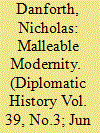|
|
|
Sort Order |
|
|
|
Items / Page
|
|
|
|
|
|
|
| Srl | Item |
| 1 |
ID:
143759


|
|
|
|
|
| Summary/Abstract |
This article examines the relationships between the CIA and the US domestic press during the 1950s through the lens of CIA covert interventions in Guatemala and Indonesia. It disputes interpretations of the press/CIA relationship that argue for significant control exercised by the CIA, and contends that there were several types of press/CIA relationship, ranging from cooperation to hostility. The most common relationship was one of friendly confluence, rooted in Cold War considerations; even well-disposed reporters, though, tended to be careful about preserving their independence. This article concludes that while the CIA/press relationships generally resulted in reporting favorable to the CIA, there were counter-trends in the 1950s that laid the groundwork for the later collapse of the CIA's public image.
|
|
|
|
|
|
|
|
|
|
|
|
|
|
|
|
| 2 |
ID:
146841


|
|
|
|
|
| Summary/Abstract |
In January 1950, Jawaharlal Nehru wrote to Liaquat Ali Khan, seeking a joint declaration of a No War Pact by the governments of India and Pakistan. The two prime ministers undertook a lengthy correspondence on this subject, spanning a year that saw rising levels of resentment and hostility between the two countries. Yet, as the inter-dominion correspondence on the No War declaration during this period shows, neither government was actually predisposed to take a belligerent position and critically engaged with the possibility of signing a declaration that renounced the use of war. As I hope to show through my discussion of the ‘No War Pact’ correspondence, relations between India and Pakistan were not necessarily confined to hostile exchanges, and both governments also repeatedly engaged with each other to attempt to find spaces of agreement and compromise. Although much of the existing literature on India–Pakistan relations characterizes it as locked in acrimony and conflict, which arose from the bitterness of partition, a closer scrutiny reveals a more nuanced picture. Attempts at cooperation and dialogue between the two governments—and the rationale for undertaking them—complicate our understanding of a relationship apparently limited to instinctive antagonism, and help in creating a more rounded picture of the India–Pakistan dynamic.
|
|
|
|
|
|
|
|
|
|
|
|
|
|
|
|
| 3 |
ID:
139163


|
|
|
|
|
| Summary/Abstract |
Using US policy toward Turkey in the 1950s as a case study, this article argues that any discussion of the role of modernization discourse in US policy-making must begin by recognizing its malleability. Modernization as an ideology could, in the agile minds of American diplomats, serve to articulate and justify diverse, even contradictory policies. In the Turkish case policymakers invoked modernization to support, and oppose, democracy and dictatorship alike. Malleability also enabled modernization to simultaneously serve as policy and propaganda: At the same time the US government implemented programs that sought to modernize Turkey's military, economy, and even its population, the US Information Service, with the active cooperation of the Turkish government, quite consciously crafted propaganda to advertise America's modernity in order to win support for the US-Turkish alliance.
|
|
|
|
|
|
|
|
|
|
|
|
|
|
|
|
| 4 |
ID:
163843


|
|
|
|
|
| Summary/Abstract |
This article offers a close reading of the first geography textbook printed by the Ministry of Education after the Hashemite Kingdom of Jordan annexed the West Bank in 1950. Examining the Hashemite regime’s early curricular attempts to incorporate its new Palestinian citizens, refugees and otherwise, the article highlights the tactics used to achieve these ends, namely a topographic centralization of Jordan, an erasure of human geography in favor of a natural one, and the foreclosure of other forms of national attachment and belonging. The discussion seeks to expand our understanding of one of the most significant narrative materials confronted by Palestinians in the aftermath of the Nakba, seeing in it a possible mechanism by which to understand the challenges to Palestinian demands for a self-determined education.
|
|
|
|
|
|
|
|
|
|
|
|
|
|
|
|
|
|
|
|
|